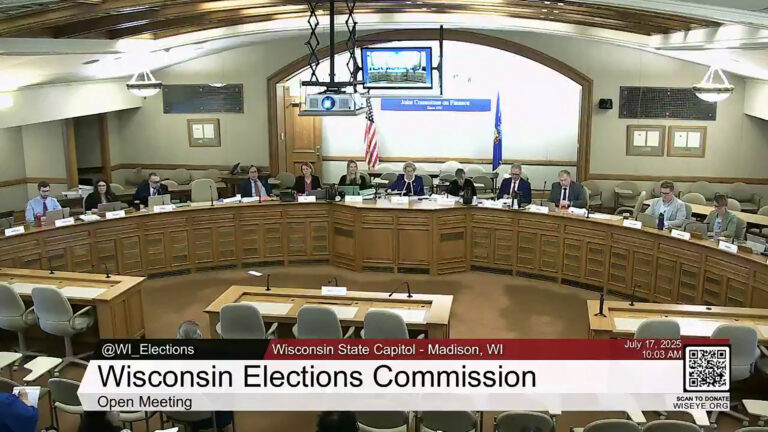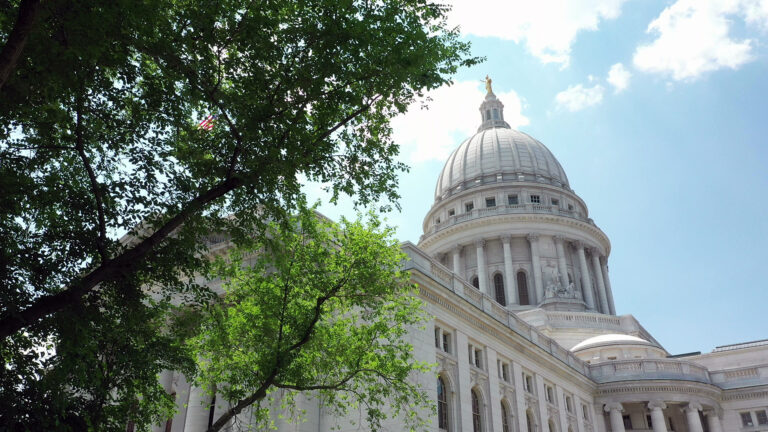Evers, Michels and culture wars over education in Wisconsin
One of the key issues in Wisconsin's 2022 race for governor is funding for schools and how students are taught about difficult issues, with the race echoing national debates over what kids learn.
By Zac Schultz | Here & Now
November 4, 2022
On Nov. 8, voters will go to the polls and decide what the future of Wisconsin’s government will look like.
Democratic Gov. Tony Evers said he has spent the last four years playing goalie, vetoing hundreds of bills passed by the Republican-controlled Legislature.
If Evers wins re-election, he can expect more of the same in his second term, as the Legislature is all but assured to remain in Republican hands. If Republican challenger Tim Michels wins, Wisconsinites can expect a very different scenario, as he has promised to “transform Wisconsin for generations to come.”
The future of public education is at stake in the 2022 election, as the candidates have very different visions for how our schools should operate.
Michels’ education plan can be reduced down to one line, and he says it in every speech.
“We are going to stop the CRT and get back to the ABCs,” said Michels at a conservative gathering.
“We are going to stop the CRT and get back to the ABCs,” said Michels at a political rally.
“We’re going to stop the CRT and get back to the ABCs,” Michels said at a debate with his opponent.
“CRTs are not taught in our schools and the ABCs are. In fact most parents teach the ABCs at home,” replied Evers at the debate
CRT is short for “critical race theory,” a college-level political theory that uses race as a lens to examine history.
But in political discourse, CRT has become part of the ongoing culture wars that drive Republican turnout at the polls.
“Now it’s all about the acronyms, LGBTQ and CRT and BLM,” said Michels at a Sept. 18 rally in Green Bay with Ron DeSantis, the high-profile Republican governor of Florida.
“When you start picking people out, whether it’s Black kids, brown kids, LGBTQ kids, wokeness, all of a sudden you’ve divided everybody,” said Evers “And now people can get excited and upset and angry. That does nothing for a conversation. And it sounds like somebody that has never walked through a public school in their life.”
Evers is very comfortable in public schools, even if the kids confuse him for someone else.
“You look like somebody I know,” said one elementary school student in Beloit on Sept. 2.
“Governor of the state of Wisconsin, you may have seen me on TV,” Evers said.
“You look like Joe Biden,” said another student, with the governor chuckling in response.
Prior to becoming governor, Evers spent his entire career in education, as a teacher, administrator and as the state superintendent. He wants to reinvest more money into public schools, proposing $2 billion in additional spending in the 2023-24 budget.
“We need more resources for them — no question about that,” said Evers.
Michels did not agree to an interview for this story, but has made his positions clear in numerous speeches and debates.
“Our education system is broken in Wisconsin,” said Michels at an Oct. 14 debate in Madison.
“The problem is we’re already throwing so much money at education. That’s been the fix, if you will, for the last 10, 20, 30 years. More money at education, more money at education, and it’s not working. The definition of insanity —we’ll leave it at that,” said Michels at a Republican primary debate on July 24.
His solution is what he calls “universal school choice.”
“We are going to have education reform. What are we going to do? Universal school choice,” Michels promised on Aug. 4 in Wauwatosa at the Chicken Burn, an annual Republican gathering.
His website is light on specifics, but the policy would likely lift the enrollment and income caps on the current voucher programs, allowing wealthy families to use tax dollars to pay private school tuition.
Evers said the problem is when voucher dollars leave the public schools, they still have to pay the light bill, and they are required to raise property taxes to make up the difference.
“This will be likely a half billion dollar property tax increase,” said Evers.
Michels says his plan is needed by pointing to a handful of Milwaukee schools in Black neighborhoods that saw reading scores crash during the COVID-19 pandemic.
“Baby Keywon and thousands of young babies like Keywon and baby girls have zero chance at being successful in life — unless we change education,” said Michels on Aug. 4 in Wauwatosa. “That’s why it’s the foundation of what we’re going to do. We’re going to get universal school choice, and we’re going to help get Milwaukee headed in the right direction.”
The problem with his argument is Milwaukee has had a voucher program for three decades — universal school choice won’t change the situation there at all.
Attacking schools may be good politics, but Evers says it’s dangerous policy.
“What does that do to our institutions in the meantime? It destroys them,” said Evers. “So it’s politics at its worst.”
And those politics may turn into policy.
Evers vetoed a Republican bill in 2021 that would have allowed parents to sue their local school districts over things like the use of names and pronouns for transgender kids.
Michels would sign it.
“If my opponent is governor, all 128 bills that I did veto over the last three-and-a-half years will become the law of the land — impacting voting rights, impacting reproductive health, impacting our public schools, you name it. Wisconsin will be a different place,” said Evers.
In his speeches to more conservative audiences, Michels’ rhetoric becomes more inflamed.
“We know they’re indoctrinating our children,” said Michels at the Sept. 18 rally.
“That is a cultural shift that the left wants. It’s part of their destroying America,” he continued.
At that same speech, Michels linked public schools with a number of movements connected to Black America.
“We believe this country is on a slippery slope towards socialism. It’s being cloaked, cloaked behind CRT and BLM and “Defund the Police,” said Michels.
“It’s all dog whistle politics,” Evers said.
To him, the racist undertones should not be ignored.
“There’s a lot of harm that’s done by dividing people, dividing people and dividing people. That’s how Trump does it. That’s how my opponent does it,” said Evers.
At that same event, DeSantis praised Michels.
“I really believe everything we’ve done in Florida you will be able to do in Wisconsin and then some,” said Florida’s Republican governor.
In March 2022, DeSantis signed legislation critics called the “Don’t Say Gay” bill, which prevents elementary teachers from talking about sexual orientation and gender identity with students.
“We don’t need Ron DeSantis to come to Wisconsin and tell us how to do things,” said Evers.
The Democrat says the politics of DeSantis and Michels aren’t good for Wisconsin schools.
“I read that he said — if my opponent’s elected — we can be like Florida. Well, whoop de-doo! Exactly who thinks that’s a good idea?,” said Evers.
So how does Michels want students educated on issues of race and gender?
“We’re going to let parents decide, not a couple of woke ‘educrats’ that are going to say ‘this is what it is now, we’re going to start teaching this, that this is bad and this is good,'” Michels said at the Oct. 14 debate.
“Obviously, he believes that there’s this liberal cabal in every school district in the state that is woke, whatever that means,” said Evers.
Wisconsin State Superintendent Jill Underly wrote an editorial in April saying “critical race theory is not a subject being taught in K-12 schools.”
But Underly also wrote “If what you’re actually asking is, ‘Are we teaching students about race and racism?’ then the answer is and should be yes.”
And that’s what has Michels upset.
“I disagree with the statement … that everything is being taught properly right now. Parents have come to me and shown me the stuff that’s being taught to their kids in school and they’re outraged and they don’t like it,” said Michels at the October debate.
Evers says Michels is trying to use that confusion and outrage to get elected.
“It bothers me because people can’t define it. And then people get angry with each other, it’s just the way of dividing people,” said Evers “And there is political sense in dividing people. If you divide people, and you divide them in such a way that 51% of them believe you, you’ll get elected.”
 Passport
Passport











Follow Us